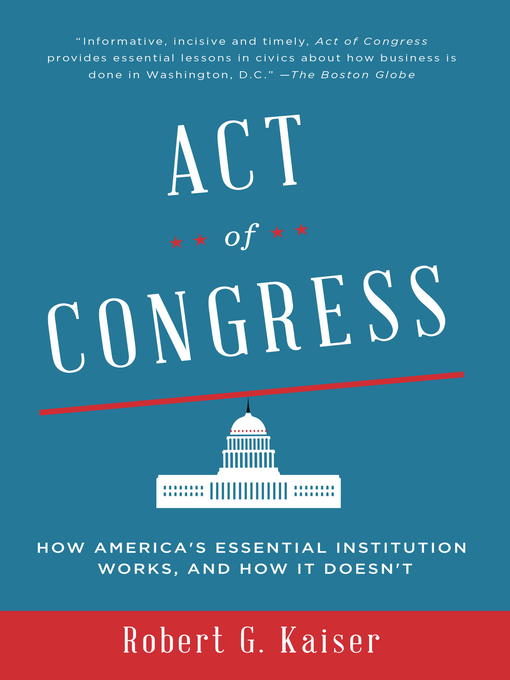
Act of Congress
How America's Essential Institution Works, and How It Doesn't
کتاب های مرتبط
- اطلاعات
- نقد و بررسی
- دیدگاه کاربران
نقد و بررسی

March 18, 2013
A financial reform bill reveals the troubled machinery of American democracy in this intricate, incisive study of law-making. Washington Post correspondent Kaiser (So Damn Much Money) chronicles the journey of the Dodd-Frank act, a complex package of banking and market regulations passed in 2011 that few voters paid attention to. The story’s charismatic protagonist is Democratic House Financial Services Committee chairman Barney Frank—but his low-key, diplomatic cosponsor, Senate Banking Committee chairman Christopher Dodd, pulls off the greater political coup by avoiding a threatened filibuster. While the bill was moving through Congress, Kaiser had access to lawmakers of both parties and their staffs, executive-branch officials, and lobbyists; he finds the drama in arcane parliamentary procedure and paints extraordinary fly-on-the-wall scenes of legislative sausage making. (“Okay, Cam, it’s just you and me, what’s it going to take?” Frank horse-trades, seeking support from bankers in a down-and-dirty meeting with their lobbyist.) Kaiser salutes a landmark bill while laying bare the process dysfunctions that menaced it: partisan intransigence; monkey-wrenching by pols seeking turf and publicity; cynical budgetary shenanigans; general ignorance of finance on the part of legislators; the influence of money and clout—especially auto dealers’ clout. His absorbing true-life political saga exposes the good, the bad, and the ugly in Congress. Agent: Amanda Urban, ICM.

April 1, 2013
A painstaking, richly detailed look at how the suite of financial reforms that followed the bank near-collapse of 2008 came to be--and nearly didn't come to be, even as they were defanged. We get the Congress we deserve, suggests longtime Washington Post reporter Kaiser (So Much Damn Money: The Triumph of Lobbying and the Corrosion of American Government, 2009, etc.), who observes that, beginning in about 1981 with the arrival of Reagan, politics began to trump policy even as "[e]xchanges of favor and petty corruption became congressional reflexes." When the American financial system threatened to melt down following the collapse of the junk mortgage market and other dubious means of speculation, Congress found itself with few "legislative statesmen and women" smart enough to understand the events that were unfolding and politically astute enough to know what to do about them. Enter Barney Frank, a scrapper and one of the first openly gay U.S. representatives. The hero of Kaiser's piece, Frank takes the lead in a scenario so threatening that even Mitch McConnell cooperated across the aisle. Though fraught with political peril, Frank saw in the financial crisis "the opportunity to rewrite the rulebook." Over the course of Kaiser's complex, fact-studded account, Frank is shown making a game effort at it despite hindrance, mostly from the Republican side of the House. You don't have to be a policy wonk or economist to understand that saga, but it surely helps when encountering passages such as this: "This law divided responsibility for the firms handling derivatives contracts between the SEC and CFTC, based on the underlying securities or indices." Remember that old saw about making sausages and making laws--that you don't want to know too much about either one? Kaiser disproves it with this lucid if sometimes numbing book.
COPYRIGHT(2013) Kirkus Reviews, ALL RIGHTS RESERVED.

November 1, 2012
The Dodd-Frank Act, called in full the Dodd-Frank Wall Street Reform and Consumer Protection Act, is a comprehensive financial reform bill guided through Congress by Rep. Barney Frank and Sen. Christopher Dodd after the 2008 economic crisis. This is not a book about the bill but about its passage through Congress over 18 months and a way to understand how Congress does and doesn't work, as the title says. Kaiser, who had access to the bill's sponsors as well as the key Republicans involved, is an Overseas Press Club and National Press Club award winner who has been at the Washington Post since 1963. So here's betting that he knows his stuff and can tell it like it is.
Copyright 2012 Library Journal, LLC Used with permission.

Starred review from April 15, 2013
At the height of the financial crisis of 2008, public distrust of Congress was nearly as great as its distrust of the Wall Street bankers behind the collapse. Still, Congress had to set aside enormous egos, political considerations, and fear of blame to pass legislation in record time to stave off a collapse. For 18 months, Washington Post reporter Kaiser was granted unprecedented access to the major figures behind the recovery legislation, most notably the colorful, irascible congressman Barney Frank and cautious senator Christopher Dodd, the men for whom the final legislation was named. In this riveting account, Kaiser details the 15-day roller-coaster drama behind the law that rescued the banking system and instituted new safeguards. Beyond the major players, Kaiser also focuses on the staffs, often the real brains behind legislation because congressmen lack expertise in or understanding of the complex issues about which they legislate. What unfolds is high drama of ill-considered symbolic actions, political posturing, number crunching, speechifying, and deal-making. Beyond the financial crisis, Kaiser offers an insightful primer on how laws are made, from conception to passage, as well as the characters and culture of the U.S. Congress, observed from an astonishing perspective most citizens never see.(Reprinted with permission of Booklist, copyright 2013, American Library Association.)

























دیدگاه کاربران